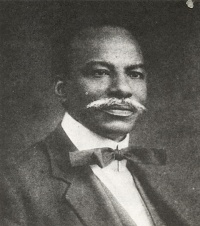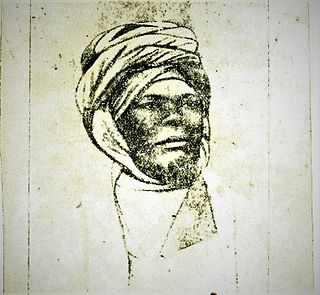
Olayinka Herbert Samuel Heelas Badmus Macaulay was a Nigerian nationalist, politician, surveyor, engineer, architect, journalist, and musician and is considered by many Nigerians as the founder of Nigerian nationalism.

Efunroye Tinubu, born Ẹfúnpọ̀róyè Ọ̀ṣuntinúbú, was a powerful Yoruba female aristocrat, merchant, and slave trader in pre-colonial and colonial Nigeria.

Lagos is the largest city of the West-African country of Nigeria, and its former capital; it is the third largest city in Africa in terms of population with about 15.3 million people. It is also the 4th largest economy in Africa.

The Oba of Lagos, also known as the Eleko of Eko, is the traditional ruler (Oba) of Lagos.
Richard Beale Blaize was a Nigerian-Sierra Leonean businessman, newspaper publisher, financier, and black nationalist of Sierra Leonean and Nigerian heritage.
Akitoye, sometimes wrongly referred to as Akintoye, reigned twice as Oba of Lagos; first, from 1841 to 1845, and a second time, from 1851 to 1853. His father was Oba Ologun Kutere and his siblings were Obas Osinlokun and Adele.

Iga Idunganran is the Official Residence of the Oba of Lagos, situated on Lagos Island. It is also a tourist attraction.

Lagos Colony was a British colonial possession centred on the port of Lagos in what is now southern Nigeria. Lagos was annexed on 6 August 1861 under the threat of force by Commander Beddingfield of HMS Prometheus who was accompanied by the Acting British Consul, William McCoskry. Oba Dosunmu of Lagos resisted the cession for 11 days while facing the threat of violence on Lagos and its people, but capitulated and signed the Lagos Treaty of Cession. Lagos was declared a colony on 5 March 1862. By 1872, Lagos was a cosmopolitan trading centre with a population over 60,000. In the aftermath of prolonged wars between the mainland Yoruba states, the colony established a protectorate over most of Yorubaland between 1890 and 1897. The protectorate was incorporated into the new Southern Nigeria Protectorate in February 1906, and Lagos became the capital of the Protectorate of Nigeria in January 1914. Since then, Lagos has grown to become the largest city in West Africa, with an estimated metropolitan population of over 9,000,000 as of 2011.
The following is a timeline of the history of the metropolis of Lagos, Nigeria.
Ibikunle Alfred Akitoye (1871–1928) was Oba of Lagos from 1925 to 1928 during what some historians refer to as the "Interregnum" years of the exiled Oba Eshugbayi Eleko. Ibikunle Akitoye was the first western educated and Christian Oba of Lagos. Akitoye's reign also marked the association of Lagos Obas with non-traditional religions.
Oba Oyekan I reigned as the Lagos Monarch from March 1885 - September 30, 1900. He ascended the throne about a month after the death of his father Oba Dosunmu.
'Oba Falolu Dosunmu served as the Oba of Lagos from 1932 to 1949, succeeding Eshugbayi Eleko. He was a former fisherman and a member of the House of Dosunmu.
Oba Eshugbayi Eleko, alias "Eleko of Eko", was the Oba of Lagos from 1901 to 1925, and from 1931 to 1932. His father was Oba Dosunmu. Eleko's struggles and legal victory over the British colonial government symbolized the struggle between indigenous rights and colonial rule in Nigeria. The outcome of the "Eleko Affair" led to the Eleko's deposition as Oba and deportation to Oyo between 1925 and 1931, years that some historians now call the "interregnum years", and that saw the reigns of Oba Ibikunle Akitoye and Oba Sanusi Olusi.
Chief Daniel Conrad Taiwo, alias Taiwo Olowo, was a trader, arms dealer, slave owner, political power broker, philanthropist and community leader in Colonial Lagos.

Mohammed Shitta-Bey, alias Olowo Pupa, was the first titled Seriki Musulumi of Lagos. He was a prominent Nigerian Muslim businessman, aristocrat and philanthropist who was involved in commerce across Lagos and the Niger-Delta region. He was also a patron of the Shitta-Bey Mosque in Lagos, and served as a leader in the Lagos Muslim community until his death. He is known to be one of the founding fathers of legitimate commerce in precolonial Nigeria; as at the time of his death he was the most prominent and wealthiest Muslim trader in West Africa.

Kosoko was a member of the Ologun Kutere Lagos Royal Family who reigned as Oba of Lagos from 1845 to 1851. His father was Oba Osinlokun and his siblings were Idewu Ojulari, Olufunmi, Odunsi, Ladega, Ogunbambi, Akinsanya, Ogunjobi, Akimosa, Ibiyemi, Adebajo, Matimoju, Adeniyi, Isiyemi, Igbalu, Oresanya, and Idewu-Ojulari.
Chief Oshodi Landuji Tapa was Oba Kosoko's war captain and one of the most powerful chiefs in the Oba of Lagos' court.
Oba Adele or Adele Ajosun reigned twice as Oba of Lagos; first, from c1811 to 1821, and a second time from 1835 to 1837. His father was Oba Ologun Kutere and his siblings were Obas Osinlokun and Akitoye, thus the Ologun Kutere line has remained the dominant line in the Obaship of Lagos.
Dosunmu, referred to in British documents as Docemo, reigned as Oba of Lagos from 1853, when he succeeded his father Oba Akitoye, until his own death in 1885. He was forced to run away to Britain under the threat of force in August 1861.
The Eletu Odibo of Lagos is the traditional nobleman that has historically served as the principal kingmaker of the Oba of Lagos. As head of the Akarigbere class of chiefs, the Eletu Odibo also serves as the prime minister of the Oba.








